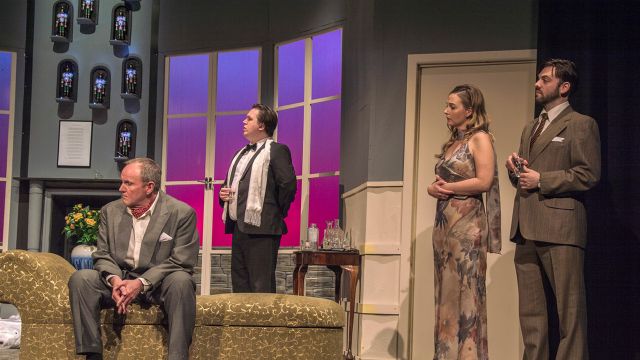And Then There Were None
Reputedly the most difficult novel Agatha Christie ever had to write, And Then There Were None - originally Ten Little Ni**ers and later, Ten Little Indians,was renamed for obvious reasons. The play is Christie’s own adaptation of the story for the stage. The novel, which clearly had a very grim ending, was changed to make the finale more appealing for theatre-goers.
Born in Devon, which is also the setting for And Then There Were None, Christie was probably best known for the long running play The Mousetrap. As a young girl I spent hours reading many of her novels, revelling in the excitement and suspense she built masterfully in every page.
Arriving at the Arts Theatre, I prepared myself for a similarly thrilling experience. Sadly, whilst some moments were tense and loud thunderclaps built terror, I left feeling somewhat underwhelmed by the overall production.
Set in 1939, this is a tale of murder and guilt which should, by its plot, cause the audience to be clinging to the edge of their seats waiting for the next victim to fall.
Ten strangers are invited to a remote island off Devon under mysterious circumstances by a Mr and Mrs U N Owen. Each of them comes with a secret, none really knowing the others nor the true reason they have been lured to this desolate place.

The play, directed for the Adelaide Repertory Theatre by Adrian Barnes, opens with a recorded disembodied voice which ominously recites the past crimes of each person. As we journey through the play, one by one, the visitors are murdered in a manner suggested by the nursery rhyme above the fire. The ending however - Agatha’s new twist- is quite unexpected if one is familiar only with the novel.
The entire play happens in a living room of an old mansion on Soldier Island. This helps to initially create a sense of the people being trapped and cut off from the rest of the world. The set, conceived by Simon Greer is quite stark and well presented, but the use of grey seems out of place in a 1939 home. Above the fireplace, in which is a large floral arrangement, is the above-mentioned poem and ten very cleverly created soldier figurines that disappear spasmodically as the cast is reduced. This is a very clever idea and adds tension as the audience carefully watches for a soldier to fall.
Costumes by Rebecca Jarratt are a highlight and very apt for the period.
Lighting by Richard Parkhill is very effective and cleverly done. Musical links and the use of a haunting song version of the poem also create mood. Some sound effects on opening night seemed inconsistent both in use and in volume, however, for example, loud seagull noises were only present at the start of the play and a thunderclap nearly caused a heart attack in some more elderly audience members!
Acting was a little uneven on opening night. There were many uncertain lines and cast members speaking over each other. Understandably blocking is limited with ten actors in such a small area, but I felt at times it was far too static.
 Julie Quick (Emily Brent) and Peter Davies (William Blore) did a sterling effort to inject energy into their roles, making them very watchable. Both also used the stage space well. Rachael Williams as Vera Clayborne gave a lovely understated performance and was certainly always in the moment. Her stand-off scene with Julie Quick had some good emotion and power. Simon Lancione as Philip Lombard worked hard to build a pratty, overconfident character and Lindsay Dunn showed a solid effort as Dr Armstrong. Kudos also to Thomas Filsell for taking over the role of Rogers, the butler, at a late hour and doing a fine job.
Julie Quick (Emily Brent) and Peter Davies (William Blore) did a sterling effort to inject energy into their roles, making them very watchable. Both also used the stage space well. Rachael Williams as Vera Clayborne gave a lovely understated performance and was certainly always in the moment. Her stand-off scene with Julie Quick had some good emotion and power. Simon Lancione as Philip Lombard worked hard to build a pratty, overconfident character and Lindsay Dunn showed a solid effort as Dr Armstrong. Kudos also to Thomas Filsell for taking over the role of Rogers, the butler, at a late hour and doing a fine job.
On the whole I felt many of the characters were rather caricature-like and needed further subtext and depth. The production unfortunately at times came across more as a melodrama than a suspenseful murder mystery. Hopefully, with time, the fluency of the play will improve and nervous line loss will abate.
Whist there were some strong performances by some of Adelaide’s experienced actors, on opening night and for this reviewer the production did not have the fear and suspense expected of an Agatha Christie play.
Shelley Hampton
Subscribe to our E-Newsletter, buy our latest print edition or find a Performing Arts book at Book Nook.

